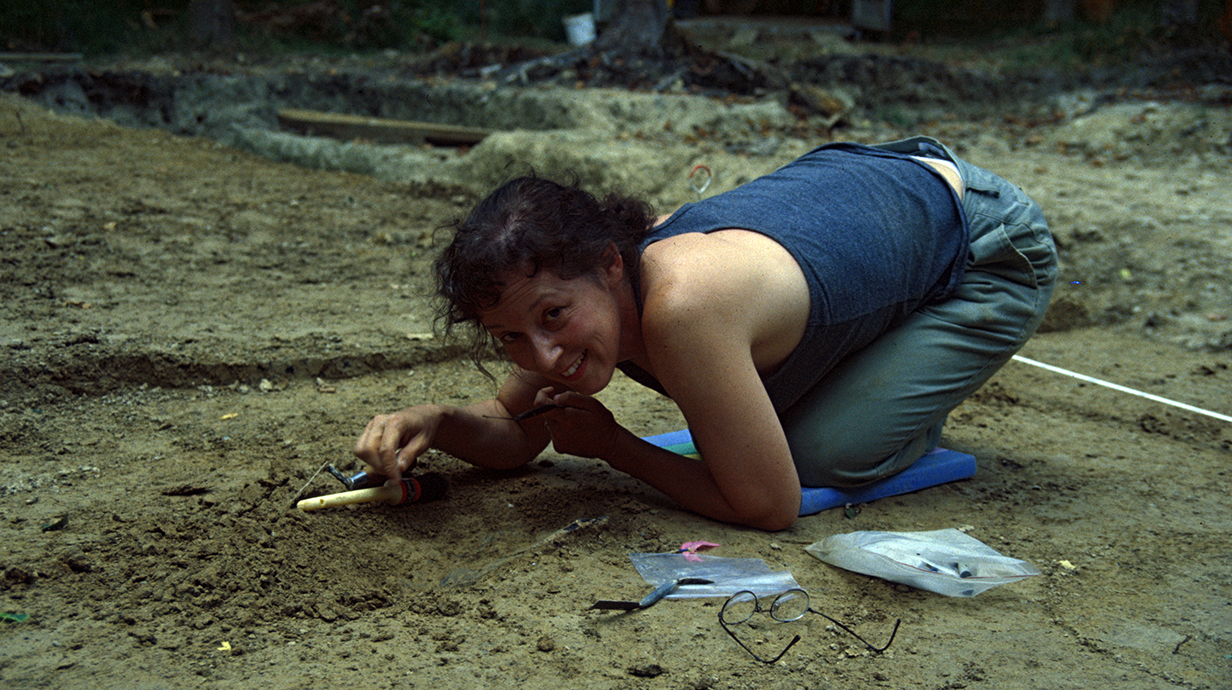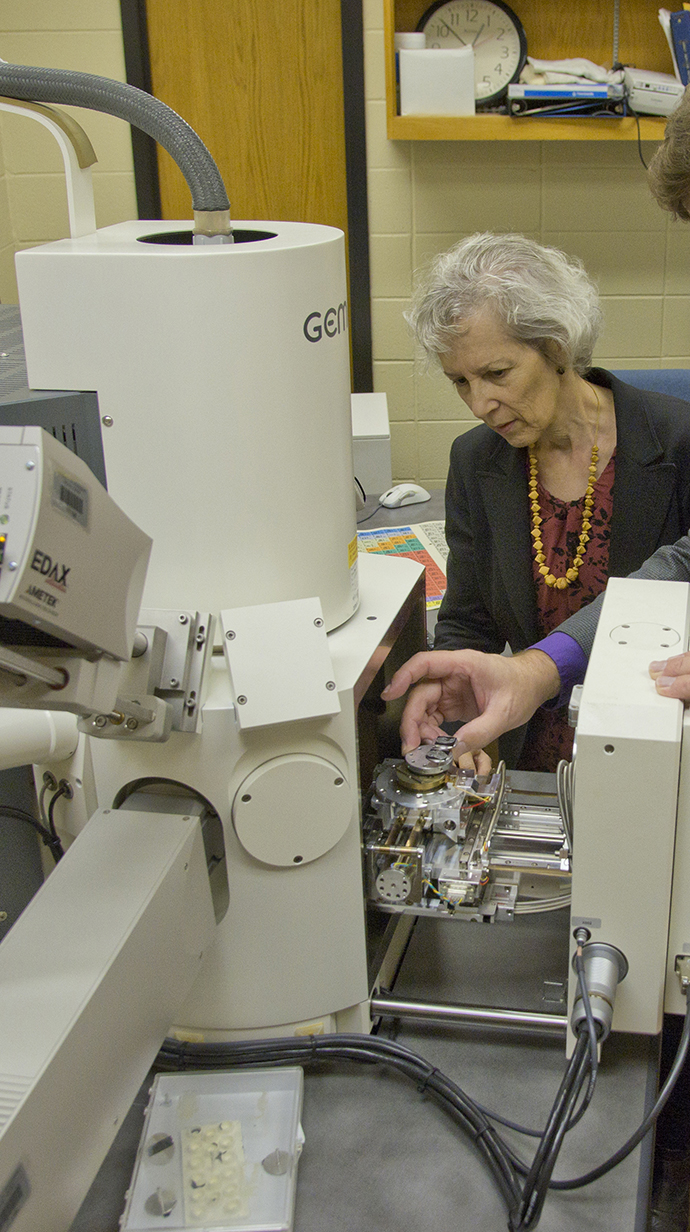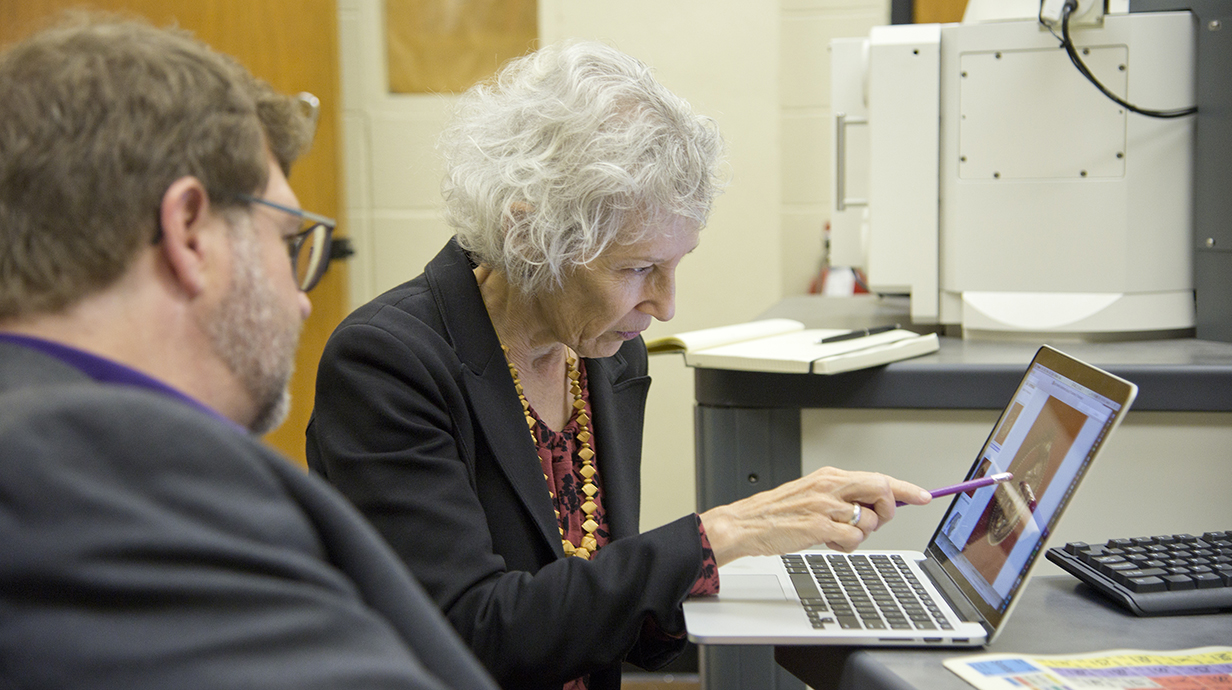Distinguished Professor 'Widens Scope' of Viking, Early Medieval Art
Nancy Wicker honored as UM Distinguished Professor

OXFORD, Miss. – The University of Mississippi has appointed Nancy Wicker, professor of art history, as its newest Distinguished Professor.
"Honoring our outstanding faculty by naming them Distinguished Professors is a great honor and tremendous recognition of their accomplishments," said Noel Wilkin, provost and executive vice chancellor for academic affairs.
"The university is its people, and it is fitting to recognize and celebrate the great accomplishments of our most outstanding faculty."

Nancy Wicker works at an excavation site. Over the years, she has conducted research at several sites around the world. Submitted photo
In 2018, UM began appointing the honorific title, which recognizes the faculty members who have demonstrated sustained excellence in research and creative achievement, teaching and service.
Wicker, who joined the Ole Miss faculty in 2003, teaches courses and researches early medieval art. This includes the art and archaeology of Scandinavia from the Migration Period of the fifth and sixth centuries through the Viking Age.
"It is very common for scholars to study Christian, Jewish and Islamic art during this time period," Wicker said. "I study none of the above. So, I've been widening the scope of early medieval art in the U.S.
"How can we art historians try to bring global concerns to medieval art if we don't cover all of Europe? It's a really important role to open the stage.
"Vikings are incredibly popular, but not very well studied as an academic subject."
Wicker's published research covers a wide range of topics, including bracteates, or gold pendants; Viking art in Spain; the sensory effects of jewelry; female infanticide in the Viking Age; and runic literacy. She has presented more than 200 papers across 19 countries and conducted on-site research in numerous additional nations.

Nancy Wicker helps place an artifact for analysis in a scanning electron microscope at the University of Mississippi Medical Center. Submitted photo
"The things I study are found archaeologically; they come out of the ground," she said. "I've been on several excavation sites, and I was the first and only American at UNESCO's Birka, Sweden, Viking archaeological site."
In 2010, Wicker was the first woman elected to foreign membership in the Philosophical-Historical Section of the Royal Society of Humanities at Uppsala, Sweden. Additionally, she is the only American ever to be included in the International Sachsen Symposium, a research network for the archaeological study of the Saxons and their neighboring peoples in northwestern Europe.
A first-generation college graduate, Wicker earned bachelor's degrees in art history and art studio from Eastern Illinois University. She received a master's degree in art history, followed by a doctorate in ancient studies from the University of Minnesota.
Michael Barnett, interim chair of the Department of Art and Art History, said Wicker is a valued member of the department.
"She has made a significant impact on many students who have noted her influence on their growth as scholars and artists," Barnett said. "Dr. Wicker's passion for teaching has played a vital role in the development of students in the department, the university and for students beyond our campus.
"Her ability to identify the areas of improvement for each individual student, and to shape the material to their needs has had a profound effect upon their development."
Wicker has co-edited three books including "Situating Gender in European Archaeologies." Her current project involves writing about the people of Viking art.
"I'm writing about the people who made it, the people who commissioned it, people who wore it or used it – whether it's jewelry or weapons, etc.," she said. "With modern metal detecting, we're finding more art that actually depicts humans, which has been breathtaking."

Nancy Wicker (right) analyzes images of Viking artifacts from a scanning electron microscope with Dr. Jason Griggs, associate dean for research in the UM School of Dentistry. Wicker and Griggs have collaborated to study how Viking jewelry shows signs of metal fatigue and breakage. Submitted photo
Each school and college has guidelines for nominations for Distinguished Professor, but the university requires that nominated faculty have at least six years of service at the highest rank of professor. Also, it is expected that awardees will have achieved a significant degree of national or international recognition.
As part of Wicker's nomination, a senior scholar outside the university wrote that her work is "highly original and at the cutting-edge of medieval studies" with its multidisciplinary approach that "draws in the most sophisticated way on the methodologies of literature and manuscript studies, archaeology, art history, cultural history and sociology."
One of Wicker's ultimate objectives is to advocate for research in the humanities.
"When people think of research, they usually imagine enormous science grants," she said. "I really want to make a statement that not everybody in art and art history studies Michelangelo and Picasso.
"I try to be a leader in saying that research in humanities is extremely important."
By
Erin Garrett
Campus
Published
May 10, 2024
